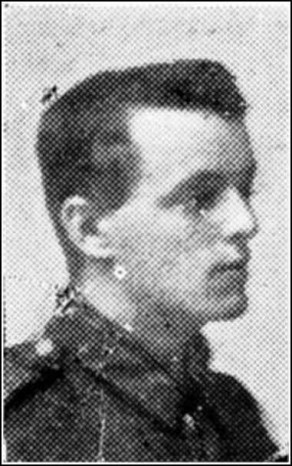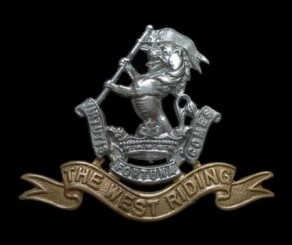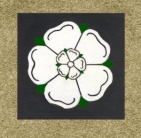
23 March 1917
THE LATE PRIVATE L. WESTERN OF SKIPTON
Some particulars of the death of this Skipton soldier will be found in our inner pages. Letters of sympathy have since been received from the Army Chaplain and a number of deceased's pals. The Rev. H. E. Tilston also mentions that Pte. Western was killed by a sniper's bullet in the head on March 12th, when he was trying to hit the periscope of a German. He was buried with the Church service in the English cemetery, he adds, and the usual cross was being erected over the grave.
Gunner D. Lister, stationed at Winchester, writes:- "Having been a chum of Laurence for the past ten years or more, I beg to offer you my deepest sympathy in your great loss. You have lost a good son and a brave soldier, and I have lost a friend that I can never replace." He also mentions that he had received the bad news from France that morning (March 19th).
"I had letters from Laurence and Percy;" he adds, "and Laurence had written part of his letter on the 12th of this month, and at the foot was a note by Captain Dixon to inform me that poor Laurence had been killed shortly after writing the letter."
From a touching letter signed "Yours in sympathy, Ptes. J. L. Berry, J.E. Core, E.M. Smith, W. Holmes, J. J. Brown, J. Preston," we take the following:- "Being your son's pals we thought it our duty to write and let you know (of his death), and I can assure you we miss him very much. He was buried in a beautiful little cemetery along with comrades who have also answered the call, and a white cross marks his grave. We, all being Skipton lads, have always been good pals together, and more so being in the same Lewis Gun team. As yet we can hardly realise that he has gone".
12 April 1918
Sergeant J. J. Brown, Skipton
Sergeant John James Brown, Duke of Wellington's Regiment, whose wife lives at 51 Eastgate, Skipton, was, we regret to say, killed by a sniper's bullet on March 31st. Twenty-nine years of age, he enlisted in 1914 and had been in France since April 1915. He was formerly employed at Belle Vue Mills, and was associated with St. Stephen's Church, Skipton. Letters of sympathy have been received by Mrs. Brown from the officers, N.C.O.s, and the men of the Lewis Gun Team, the one from the Sergeant, containing the following:- "His death is a sad blow to us, and we would like to go so far as to say not only do the boys of his platoon feel awfully cut up at having lost one of the best N.C.O.s, but also the boys of the Company in general. He was always bright and cheerful, always ready to carry out his duties in a most soldier-like manner, and last, but not least, always civil and kind to the boys whom he had in his charge."
14 June 1918
Posthumous Honour for a Skipton Hero
In one of the recent Honours lists, as a winner of the D.C.M., appeared the name of Sergeant J. J. Brown, West Riding Regiment, of Skipton, whose death in action on Easter Sunday we have already recorded, and whose photograph appeared in our issue of April 19th 1918. His wife, who lives at 51 Eastgate, Skipton, has now received a letter from Captain Hugh Dixon, of Steeton, congratulating her on the honour, and adding:- "It is very sad to think that your husband is unable to receive the honour personally, but I hope you will have it presented to you on some future date. No honour was better won than that of your late husband's, and it will be something for you to treasure. We are all very pleased that his services have received such a reward, and are proud to have had such a man in the Battalion."
25 October 1918
Posthumous Honour for Skipton N.C.O.
In an official list of awards of Distinguished Conduct Medals published this week appears the name of the late Sergeant J. J. Brown, West Riding Regiment, of Skipton, with the following particulars of the deed for which the decoration was awarded:- "Acting as company sergeant-major, he continually conducted ration and supply carrying parties to detached and isolated posts, over exposed areas swept by artillery and machine-gun fire. He was wounded in the chest by a machine-gun bullet, but declined to be evacuated, and remained at duty till the battalion was relieved."
Sergeant Brown, whose wife lives at 51 Eastgate, Skipton, was killed by a sniper's bullet on March 31st. Twenty-nine years of age, he enlisted in 1914, and went to France the following April. He was formerly employed at Belle Vue Mills, and was associated with St. Stephen's Church, Skipton.
28 March 1919
BROWN - In loving memory of Sergt. John James Brown, Duke of Wellington's Regt., who was killed in France March 31st, 1918.
A lonely grave in France,
Where a brave young hero sleeps,
There's a cottage home in England
Where his dear ones sit and weep.
May the heavenly winds blow softly
O'er that sweet and hallowed spot.
Though sea divides his grave from us,
He will never be forgot.
From his loving Mother and Sister, 10 Mill Bridge, Skipton.
23 February 1923
ODDFELLOWS' WAR MEMORIAL
UNVEILING CEREMONY AT A SKIPTON LODGE
OVER 200 WHO SERVED
There was a large attendance of local members of the Independent Order of Oddfellows at the Friendly Societies' Hall, Skipton, on Saturday afternoon, on the occasion of the unveiling of a war memorial to the members of the Loyal Traveller's Friend Lodge, I.O.O.F, M.U., who fell in the war.
The Memorial takes the form of a beautifully designed scroll within an oak frame with a glass front, the work of Mr. H. Spencer, junr., and it bears the inscription:-
LOYAL/TRAVELLER'S FRIEND LODGE,/SKIPTON DISTRICT ./I.O.O.F. ROLL OF HONOUR M.U./OF/THOSE MEMBERS OF THIS LODGE WHO FOUGHT FOR THEIR KING AND COUNTRY TO UPHOLD THE SACRED CAUSES OF BROTHERHOOD AND HUMANITY IN THE GREAT WAR, 1914-1918.
Below the inscription are the names of 173 members who served in the war, and of the 40 members who were killed. The names of the fallen occupy a central position on the scroll, and above them are the following words:-
IN MEMORIAM
OF THOSE WHO MADE THE
SUPREME SACRIFICE.
THEIR HEARTS ARE LIFTED UP
THEIR HEARTS
THAT HAVE FOREKNOWN
THE UTTER PRICE,
THEIR HEARTS BURN
UPWARD AS A FLAME
OF SPLENDOUR AND OF
SACRIFICE
The names of the fallen are as follows:- H. Armstrong, J.J. Brown, J. Barrett, Robt. Brown, W.W. Bell, A. Clayton, W.H. Coles, T.C. Chew, Tom Downes, T.M. Drummond, Jos. Emmott, Thos. Edmondson, J. Easterby, F. Gallagher, J.W. Garwood, G.E. Godwin, S.J. Hargreaves, M. Hargreaves, A. Hebden, J. Hebden, A. Hawkswell, T.E. Inman, M. Lund, R.C. [R.G.] Metcalfe, Hbt. Maudsley, Hy. Maudsley, A.J. Pimnock [Pinnock], H.Y. [Harry] Riley, T.W. Storey, J.H. Stewart, R. Spencer, J.W. Shuttleworth, Wm. Tempest, Hbt. Thompson, Fred Thornton, J.W. Varley, John Ward, J.A. Whittaker, J.W. Whittaker, and R.D. Whittaker.
The Unveiling Ceremony
The unveiling ceremony was presided over by Bro. Thos. Bellamy, and was performed by Bro. Amos Culpan, Prov. C.S., and a simple service included the singing of the hymns, 'O God our help' and Kipling's Recessional, 'God of our fathers,' and the reading of a portion of Scripture, and the offering of a prayer by Bro. James Greenwood, of Bradford, and formerly of Skipton.
Bro. Bellamy observed that those members of the Lodge whom they were met to honour went into battle, suffered untold privations, and, in many cases, made the supreme sacrifice. They gave their lives in defence of their homes and their country. Further than that, they gave their lives for justice and freedom, and in order that we might live. It was the duty of Oddfellows, equally as much as other sections of the community, to do everything within their power to make the country better for that sacrifice. "In the time of our prosperity," concluded Bro. Bellamy, "never let us forget those who served us in the time of our adversity."
A Lesson of the War
Prior to unveiling the memorial, Bro. Culpan described the ceremony he had been asked to perform as one not unattended by sorrow. It was an occasion upon which one felt a desire to make their Order better for the sacrifice of its members, and to extend the true spirit of brotherhood. In nearly 4,000 of their Lodges they would find a roll of honour. Over 22,000 of their members made the supreme sacrifice, and thousands of others were ruined and shattered in health and without prospects for the future. Each and all of them ought to perform some daily service that would make the sacrifice of those men worth while. One result of the terrible ordeal of 1914 to 1918 was the creation of a better feeling between men, and a desire to break down the class barriers that formerly existed. That was one of the great lessons of the war.









This book “Craven’ s Part in the Great War” was given to my maternal Grandfather. All soldiers who came home in Craven received this book and they had their names printed in the front of them. He was fortunate enough to survive fighting as a soldier during the 1st WW.
During the late 1970’s his widow (my Gran ) gave the book to me.
My paternal Grandma was visiting us shortly after I was given the book and I happen to mention the book to her and she knew her maternal Uncle
was in the book and she pointed him out to me. John James Brown.
A Ibbotson